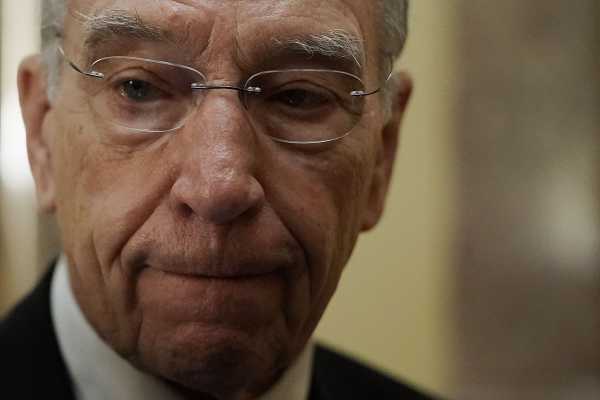
The Senate might be in recess until after the midterms — but Republicans aren’t letting up when it comes to judicial nominees.
Judiciary Chair Chuck Grassley insisted on holding a confirmation hearing for six federal judges on Wednesday, even though he himself — and the majority of the committee — weren’t able to attend. Most senators have now returned home to either campaign for the midterms or take care of other state business. In the course of the hearing, the only lawmakers who were present of the 21-member committee were Republican Sens. John Kennedy (LA), Orrin Hatch (UT), Ben Sasse (ME), and Mike Crapo (ID).
It’s an unprecedented arrangement, all 10 Judiciary Democrats say.
While confirmation hearings have been held during recesses before, they’ve only been done so with the consent of the minority, Democrats wrote in a letter urging Grassley to reschedule. Grassley argues, however, that Sen. Dianne Feinstein (D-CA) previously agreed to these dates even though she knew recess could have started earlier than expected. He says that the timing for these hearings — which have been set for October 17 and 24 — has already been pushed at least once and he’s simply refusing to do it again.
Grassley’s decision to barrel ahead with these panels over vocal Democratic opposition is yet another move that illustrates how relentless Republicans have been in their commitment to jamming through their judicial nominees, upending any illusion of bipartisan process while doing so. It also follows a bitter and contentious confirmation process for Supreme Court Justice Brett Kavanaugh, during which Republicans disregarded custom and resisted efforts to review his full record in order to expedite his confirmation.
Democrats emphasize that this arrangement means that they will not have an opportunity to effectively scrutinize the slate of nominees who are being considered, some of whom activist groups have flagged as controversial. Republicans don’t seem to care.
“An essential part of that vetting process is an opportunity to question nominees in a public hearing,” Senate Judiciary Democrats emphasize. “Holding hearings during a recess, when members cannot attend, fails to meet our constitutional advice-and-consent obligations.” With fewer Democrats present, these nominees aren’t expected to face as stringent a grilling as they likely would if a full slate of lawmakers were around.
Who are the judges Republicans are holding these hearings for?
Allison Rushing, a nominee for a seat for the Fourth Circuit who testified on Wednesday, is among those being considered in these hearings. She’s been called out by the Leadership Conference on Civil and Human Rights given concerns about her stances toward civil rights. Rushing had previously spent a summer working with the Alliance Defending Freedom, an organization that the Southern Poverty Law Center has classified as a hate group for its efforts to advance anti-LGBTQ policies.
“Scheduling Ms. Rushing’s hearing for October 17, 2018 over Democratic objections — during a Senate recess when senators are out of town — is just the latest example of Chairman Grassley bulldozing over the minority in order to remake the federal courts in Trump’s image,” the Leadership Conference’s Vanita Gupta said in a statement.
Sen. Hatch, in his questioning on Wednesday, opened by simply telling Rushing — “I’m very impressed with you.”
“There has been a concerted effort by my friends on the Democratic side to stall and re-stall and that’s just a fact,” Kennedy told reporters before the hearing. “We’re going to get all the nominees in front of the Senate. … Sen. [Mitch] McConnell [the Senate majority leader] has said that even if we have to stay here on Christmas Eve … we’re going to be here voting.”
Activists say this shows just how aggressively Democrats need to fight back
Activists note that this move is another sign that Republicans will do whatever it takes to advance their judicial aims — and that Democrats need to fight back even harder.
“The GOP plan is an expression of contempt for the institution of the Senate, for the Judiciary, and for the country,” says MoveOn Washington director Ben Wikler. “It’s a desperate move that reflects the toxic unpopularity of Trump’s extremist judicial nominees.” Grassley’s decision also comes in the wake of a deal that Democrats made with Republicans just last week, fast-tracking 15 Trump-nominated judges so red-state Democrats could return home and campaign.
Grassley doesn’t seem particularly perturbed by the latest critiques. He notes that Democrats should simply sort out their other engagements if they’re prevented from attending the hearings.
Since Republicans currently have the Senate majority and are expected to keep it, they’re basically able to handle judicial nominations however they see fit. However, Democrats do have some recourse, notes a progressive activist familiar with how these processes work. The activist asked to not be identified by name in order to share some broader thoughts on the subject.
To further register their opposition, Democratic senators could attend these hearings or submit a barrage of written questions for the nominee, the activist says. They also have the ability to boycott the committee markups when the nominees will be considered and object to broader unanimous consent agreements to confirm these nominees when they reach the Senate floor.
It’s possible none of these efforts will ultimately stop the nominees from going through, the activist notes.
They would demonstrate, however, that Democrats have tried their best to at least put up a fight, when Republicans clearly have no qualms doing so themselves.
Sourse: vox.com






